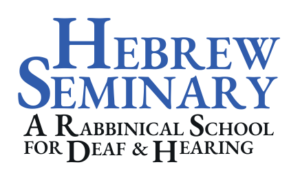HEBREW SEMINARY
Summer Semester 2017
A Purposeful Torah Pause
June 25 – August 24, 2017
Pause with us this summer.
Pause with purpose
to pursue rabbinic ordination or consider it.
Rabbi Cantor Rob Jury returns this semester with a practical rabbinics class, Shabbat Liturgy, and Rabbi Daniel Vaisrub is offering a “companion” Talmud class, Ancient & Modern Approaches to Shabbat.
Rabbi Shari Chen is offering a new Practical Rabbinics class: Preparation in Reading & Signing the Torah. Students will learn how to prepare themselves to read Torah at the Bimah for services. This will include reading without vowels, translating from Hebrew to English and an introduction to biblical ASL signs. ASL interpreter Cathy Silvern will instruct the students in key signs for select readings.
The focus of the Torah readings will be Jewish holidays beginning with the High Holidays. Among the reading will be: Bereshit – Vayeira 22:1; Devarim – Nitzavim 29:9; Devarim – Nitzvin 30:11; Vayikra – Kedoshim 19:1; Vayikra – Emor 23:1.
Rabbi Cantor Michael Davis is offering two new summer courses:
Trope Theory &
the Visualization of Hebrew Grammar through Ancient Hand Signs
You may be familiar with trope as the ancient art of chanting Torah and Haftarah. In fact, there are at least seven different systems of trope within the Eastern European modes alone, the system that is standard in the U.S. Outside of our Ashkenazi tradition there are many other Jewish musical systems, equally varied and ancient.
What unifies all these trope traditions is their grammatical function as a set of syntactical markers. Trope is a highly sophisticated system – much more so than English punctuation. It is an essential tool for unpacking the ancient sacred Hebrew of the Tanakh which is often written in succinct prose or poetry. The commentators through the ages have used trope as a means of interpretation through punctuation.
Chironomy, or hand signals, is an ancient way of indicating the musical turns of chanting. Combined with an understanding of the grammar of trope, this is a way of performing the language of the Torah through hand gestures.
Jewish Peoplehood in Modern Times – A Study of Zionism(s)
A central challenge that faced Judaism in modernity is how to self-define as a people in an open society. One of the solutions to this challenge has been Zionism in its many forms: cultural, political and religious. “Zionism(s)” exist as systems of thinking and being that are separate from either the Israeli or the American Jewish communities. We will study the context, content and implications of various forms of Zionism as well as their reception.
Our main textbooks with be: “The Zionist Idea” ed. Arthur Hertzberg and “The Jew in the Modern World” eds. Paul Mendes-Flohr and Judah Reinharz.
Also, allow us to share a taste of Fall 2017 when Rabbi Goldhamer will be offering two classes:
Sundays 12:00 – 1:30 pm starting October 15th, 2017
Chassidic and Kabbalistic Literature featuring the Baal Shem Tov and Levi Yitzchak Berditchev and including Sefer Degel Machaneh Ephraim and Kedushat Levi.
Students should be familiar with Hebrew.
Rabbi Goldhamer writes: I look forward to teaching this class because even though both teachers, the Baal Shem Tov or Besht and Levi Yitchak Berditchev, lived several hundred years ago they were very involved in the current politics of their time especially as it affected the Jewish community. Yes, they were very serious scholars but they were all very serious political commentators. The Besht invited all people, including a cossack or two, to study with him. And Hebrew Seminary invites you!
Biblical Commentary
Enrollment open to Hebrew Seminary graduates, thesis students and students who have completed their Hebrew language requirements.
Commentators will include Rashi, Ramban, Kedushat Levi, Degel Ephraim, and Maor VaShemesh.
Students will translate biblical commentary from two schools of exegesis: Nigleh-Revealed and Nistar-Hidden. Students will see that translated texts from the Nistar school are very similar to one another and translated texts from the Nigleh school are very similar to each other. Nistar commentaries are full of hidden secrets and include metaphorical, remez and sod interpretations. Nigleh commentaries s are very straightforward. None-the-less, Nigleh commentary can be quite tricky at times. Therefore the students’ ability in the different translation styles will constantly be tested.
Students will use the following texts:
| Mikraot Gedolot : Meorei HaChassidut (5 vol.) hard cover (184362) |
| Mikraot Gedolot – Hamaor : Torah (medium size – 5 vol.) hard cover – boxed set (18722) |
Hebrew Seminary graduates serve in a variety of roles – as pulpit rabbis, educators, chaplains, in public service and serving those with special needs, including the deaf community. Hebrew Seminary has been an inclusive and egalitarian community for the study and practice of Judaism since our founding in 1992. Our ordained Rabbis and Jewish educators support underserved Jewish populations.
Hebrew Seminary has the highest commitment to traditional scholarship. This includes Talmud, Bible, Kabbalah and Hebrew, all taught by an outstanding faculty led by our President, Rabbi Dr. Douglas Goldhamer. Hebrew Seminary is all about learning to hear the voice of God in our texts and in each other. Our program is intensive and inspiring.
HEBREW SEMINARY
A RABBINICAL SCHOOL FOR DEAF & HEARING
4435 W. Oakton, Skokie, IL 60076
847-679-4113 • fax: 847-677-7945
info@hebrewseminary.org • hebrewseminary.org

